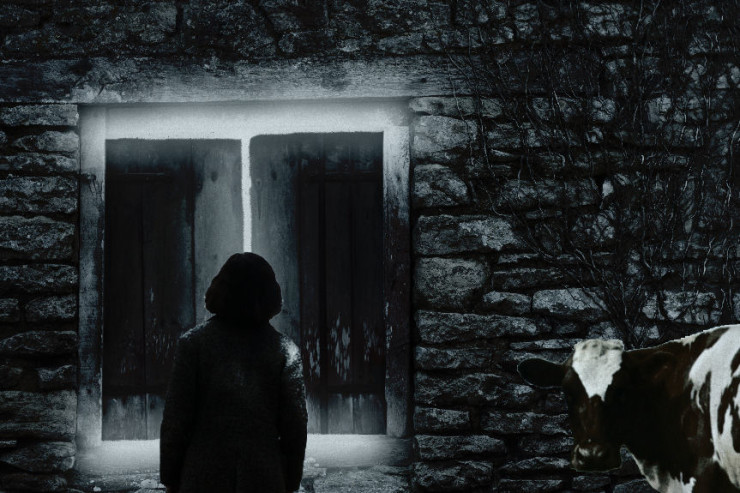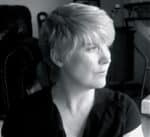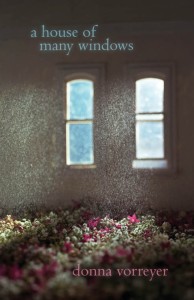Poetry takes work—poetry is work—and it’s also a house filled with windows, enabling the poet to look outward and the reader to look inward. Two recent collections underscore both points.
I’m always looking for stories about poetry at work, and invariably finding them. I found quite a few in Nurses Who Love English (2013) by Paula Marie Coomer. I found quite a few other things as well.
Coomer is a poet, novelist, and essayist. She’s previously published a poetry collection, Devil at the Crossroads (2006), and a chapbook, Road, containing one poem. Her novel Dove Creek was published in 2011, the same year she published a collection of short stories, Summer of Government Cheese. She’s even written a memoir about food and published a cookbook based on the memoir.
Nurses Who Love English, however, has been my introduction to her writing. My favorite poem in the collection, “Of Toughness, ” also happens to be the longest. It reads like the 23rd Psalm in the Bible, except it also reads like a personal history, from growing up near the Ohio River in a home with an outhouse to first love (ended because her parents’ disapproval of her love’s religion), and first marriage, children, divorce and career. It’s a remarkable poem.
I also enjoyed this poem, possibly because it reminds me of the poems created during Tweetspeak Poetry’s poetry slams on Twitter.
Take me. Take me to a heathen specialist
who unwinds done things. Take me to space
where I can breathe deep as a blue newborn.
Calculate my pins and needles. Cover them
with threads and down silk and whatever soft
you can find and pretty smells. Don’t balk
at my request for layers of paint. Don’t willow
away. Push your bushel apart from yourself.
Hear me bleed properly. Hear me shake the rattle
of mystery. Seize us into our starting days.
Start the honey dawn. Start the trembling.
Let the binary winds swirl joined and make us
taut and inseparable. Be an occasion. Be
a romance. Drink from the history cup. Wave
a silver wand like magic in my hair. Drape
me in ermine and cherry slippers. Start
to dance. Start to sing. Sing with fragrance.
Sing with the fragrance of petals violet
and sweet.
* * * *
I particularly like Coomer’s use of imperative verbs in this poem.
Nurses Who Love English is an accomplished collection of poems by a writer clearly comfortable in multiple writing genres.
The title of A House of Many Windows, published in 2013 by Donna Vorreyer, is taken from a quote by Robert Louis Stevenson: “The body is a house of many windows: there we all sit, showing ourselves and crying on the passers-by to come and love us.” That quotation frames the collection, with the metaphor of windows being something we can use not only to see out but to allow others to see in.
And see inside we do. The poems read like fragments of a memoir, revealing a life that is intensely personal and self-examined.
Capture the moon, and keep it
tucked in the folds of your robe.
You have hidden more than this: in
small drawers, in boxes, in creases
no iron can flatten. Others have tried
but weakened at its pleading, its
insistence on returning the sky.
Pay it no mind. You now rule all tides
and cycles, and you have learned
to be hard. Stand at the window like
a woman staring at the sea. Admire
your black handiwork.
Who cares if the night is blind,
its white eye plucked and hooded?
Swathed in fleece against your skin,
the moon births haloes at your feet.
Vorreyer is the author of Womb / Seed / Fruit (2010), one of six chapbooks she’s published in the last several years. A middle-school teacher, she’s currently the poetry editor at Extract(s). Her work has been published in several literary journals and anthologies. She blogs at Put Words Together. Make Meaning, where she recently featured poet Jeannine Hall Gailey, author of The Robot Scientist’s Daughter, which was featured here at Tweetspeak Poetry earlier this year.
Several of the poems in A House of Many Windows have been previously published in various poetry and literary journals. But all of them are exactly like windows, some clear, some colored and paned, all of them fully aware and alive.
Photo by Ian Burt, Creative Commons, via Flickr. Post by Glynn Young, author of the novels Dancing Priest and A Light Shining, and Poetry at Work.
Browse more Poetic Voices
___________________________

“How to Write a Poem is a classroom must-have.”
—Callie Feyen, English Teacher, Maryland
- Longfellow’s “Paul Revere’s Ride”: Creating a National Legend - April 17, 2025
- Poets and Poems: Katie Kalisz and “Flu Season” - April 15, 2025
- Poets and Poems: Michelle Ortega and “When You Ask Me, Why Paris?” - April 10, 2025





Maureen says
I’m unfamiliar with Paula Coomer’s work; I like very much the poem here.
I’ve been reading Donna Vorreyer’s poetry for some time and read earlier this year the collection noted here. I found it to be often moving, sometimes exquisitely painful and haunting, and, by its conclusion, wholly positive. I loved her sustained use of her beautiful metaphor.
Glynn says
Maureen, thanks for the comment. They are two very different poets, but I had similar responses from reading both collections.
Matthew Kreider says
Thanks for sharing such rich and interesting voices today. Each of the poems has some beautifully assertive lines, which ask me to sit still and consider….
And I always appreciate these reviews, Glynn — always look forward to you riding back into Tweetspeak Town, pulling a wagon full of the poetry you’ve picked up from your travels out on the frontier. 😉
Glynn says
YeeHaw, Matthew! I have my poetry lariat at the ready!
Thanks for the comment.
Mary Sayler says
Glynn, your post will be a blessing to other poets in our Christian Poets & Writers group on Facebook – https://www.facebook.com/groups/Christianpoetsandwriters/ – so I’ll highlight it on the Christian Poets & Writers blog – http://www.christianpoetsandwriters.com. Thanks and blessings for all your good work for poets and poetry!
Glynn says
Mary, thank you so much!
Paula Coomer says
Thank you so very much for the notice and this lovely review. Happy to learn of Donna Vorreyer’s work.
Sandra Heska King says
I have Paula’s book. I love it. For many reasons. 🙂